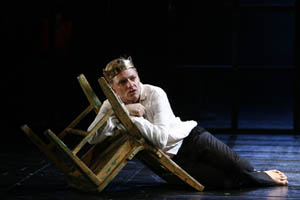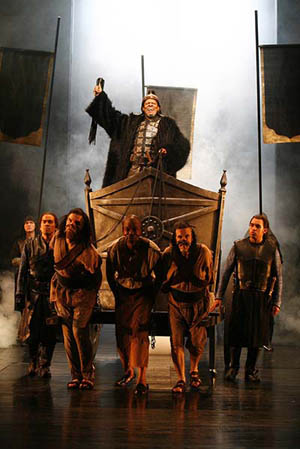In the course of four days, Charlie and I ended up seeing not one but two plays at the Shakespeare Theatre here in DC; first Edward II (on Thursday night), then Tamburlaine (on Sunday night). Both were written by Christopher Marlowe, but at opposite ends of his (admittedly very short) career.
And oh, what a difference those years made. Both of these plays are rarely performed, but for very different reasons indeed.
 Edward II came across almost perfectly—bringing Wallace Acton out of retirement to play the titular role was perfect. Acton brought a mixture of tenderness and anger and conflict to the role, as a king who was more interested in being with his beloved Gaveston than worrying about the rest of the country. I think it’s a lot to director Gale Edwards’s credit that even knowing exactly how it would all end (hint: badly), she makes one hope for something else.
Edward II came across almost perfectly—bringing Wallace Acton out of retirement to play the titular role was perfect. Acton brought a mixture of tenderness and anger and conflict to the role, as a king who was more interested in being with his beloved Gaveston than worrying about the rest of the country. I think it’s a lot to director Gale Edwards’s credit that even knowing exactly how it would all end (hint: badly), she makes one hope for something else.
Her addition of Gaveston as a ghostly figure several times later in the play is perhaps laying the emotion and relationship a bit thick, but I couldn’t really complain; it added a level of elegance and wistfulness that I think the play needed. At the same time, and I know this sounds strange, it’s a bit subtle in places. She didn’t overuse the effect, thank goodness, and we left with a very positive, “I’m glad we went and saw this,” feeling.
And then there’s Tamburlaine. The idea that this is a play initially performed over the course of two nights and was twice as long as the (three hour!) performance we saw fills me with horror. And, apparently, director Michael Kahn. But one got the impression that he was less-than-fond of the play at all (Tamburlaine is told he will never defeat someone, at which point he does, then takes his foe’s lands for his own and marches on leaving death and destruction in his wake, at which point the cycle starts all over and over and over and over again), and was faced with the following dilemma: do you take a bad, overwrought play and tell the actors to do it straight-faced? Or do you have them eat the scenery?
 Hello, scenery-eating.
Hello, scenery-eating.
Seriously, it was over-the-top crazy. In the opening scene, I was reminded of a Gilbert & Sullivan play with all of the mincing around the stage and overly-affected voices and gestures. And let me just say right now that I loathe Gilbert & Sullivan with a passion. So you can just imagine the look on my face right around then. (Although as I could not help but note later, this meant that I finally got my dream come true; a Gilbert & Sullivan production where everyone dies horribly and violently.)
Avery Brooks ate the scenery with the best of them, although he at least was clearly having fun with it. But actors who were restrained and subtle in Edward II were anything but that in Tamburlaine, and the more we saw, the clearer it became that this was Kahn’s directorial choice rather than any fault by the cast.
It’s a pity, too, because the staging and the costuming were both beautiful. Brooks-as-Tamburlaine riding in through the gates of the city towards the end was jaw-droppingly beautiful, and the orange-backlit-drummers that appeared periodically looked great enough that I want them installed in my home. But after the intermission, a good 30 people were missing in the lower seat section and who knows how many up in the higher seats left as well. (Not to be confused with the person who left partway through the second half after the queen died. I guess she was all he cared about at that point.)
Then again, Brooks’s bow at the end? It wasn’t one of joy, or even a, “This was hard but worth it.” No, his bow was someone who had just been forced through a hellish experience. I am now starting to suspect his “injury” was really him needing a two-week mental break from the badness of it all. (Ok, probably not. But it’s a funny thought!)
Ah well. I’m still glad I went, if only for the whole, “My head just exploded from the badness of this director’s choices” experience. And after all, it sure did make us appreciate Edward II that much more. Next up is Mary Zimmerman’s Argonautika, which promises to be lovely.